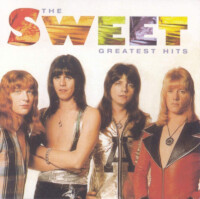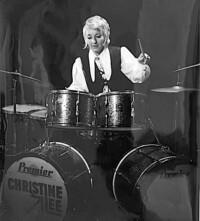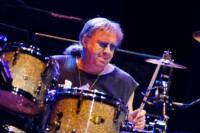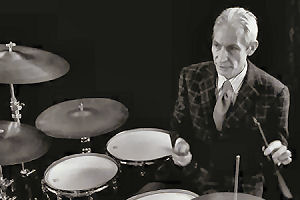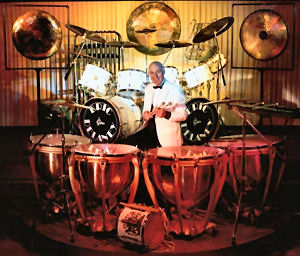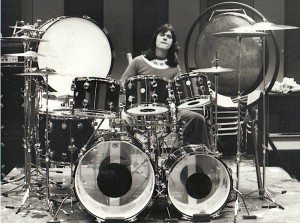 We’ve got to the magic ’50’ mark as far as Groovers and Shakers articles are concerned, and to celebrate, we thought it was time to look at a drummer who is very close to us at mikedolbear.com – Bob Henrit himself
We’ve got to the magic ’50’ mark as far as Groovers and Shakers articles are concerned, and to celebrate, we thought it was time to look at a drummer who is very close to us at mikedolbear.com – Bob Henrit himself
At the rate Bob’s writing these, he’ll be 77 when he writes his 100th Groovers and Shakers article in four years or so. This shouldn’t be a problem as there are hundreds more potential subjects for him to look at, so it could go on much longer than 2021!
So, ladies and gentlemen, the subject of this months Groovers and Shakers, we give you… Mr Bob Henrit.
Robert John Henrit was born in Broxbourne, England towards the very end of the Second World War, on May 2nd, 1944 to be precise. He grew up in Waltham Cross which is in the leafy suburbs of North London on the very edge of Hertfordshire. He was brought up a Catholic and educated at first a Catholic Junior School, then a College run by Jesuits – a system of education which left its mark on him and many of his fellow ‘Old Ignatians’ who include George Martin, Alfred Hitchcock, Clem Cattini and (allegedly) Bruce Forsyth.
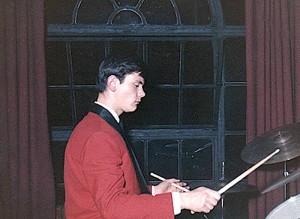 His mother’s side of the family were Irish and could knock out a tune on anything, so there was some musical ability already in his genes. After a few almost completely wasted tap dancing lessons; he began his life properly in music, playing in a skiffle band aged 11. Along with many others in the British ‘Baby Boom’, skiffle was ‘the thing’ and Bob played the essential item required to make it a ‘proper’ skiffle band – the washboard! Strangely, Bob’s very first group was completely coincidentally called ‘The Roulettes’ – obviously a taste of things to come.
His mother’s side of the family were Irish and could knock out a tune on anything, so there was some musical ability already in his genes. After a few almost completely wasted tap dancing lessons; he began his life properly in music, playing in a skiffle band aged 11. Along with many others in the British ‘Baby Boom’, skiffle was ‘the thing’ and Bob played the essential item required to make it a ‘proper’ skiffle band – the washboard! Strangely, Bob’s very first group was completely coincidentally called ‘The Roulettes’ – obviously a taste of things to come.
The next obvious step was to invest in a drum kit so he could progress further into the sacred art of drumming. Bob took to this like a duck to water and was soon able to play along to the not-quite rock ‘n’ roll music he heard on the family wireless – which, like most in post-war Britain, was on hire from Radio Rentals.
Bob says: “I wanted to have drum lesson to improve myself but unfortunately the only teacher in the area was unwilling and unable to teach me how to rock ‘n’ roll, he could only instruct me in strict-tempo dance music – a genre in which I had not the slightest interest. So I bought a tutor book written by a chap called Norman Burns and got on with teaching myself the basics”.
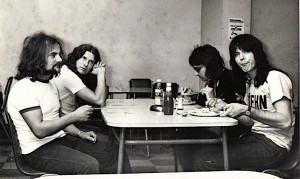 His part of North London was a hotbed of musicians and music and fortunately there were an awful lot of places for him and his friends, such as Chas Hodges, Dave Peacock, Mike Berry and Russ Ballard, to get playing experience.
His part of North London was a hotbed of musicians and music and fortunately there were an awful lot of places for him and his friends, such as Chas Hodges, Dave Peacock, Mike Berry and Russ Ballard, to get playing experience.
A soon-to-be exceedingly famous singer named Harry Webb (who pop quiz devotees will know eventually assumed the stage name of Cliff Richard) had been Bob’s next-door neighbour and when he was getting ready to leave school the newly named Cliff was instrumental in him getting a gig playing drums for the other, slightly more dangerous pop star of the era, Adam Faith. As Bob puts it: “This gig lasted for five years and produced several successful records like “The First Time”, “Long Cigarette” and “Bad Time”. It also gave all us ‘mid-teenagers’ in the group an awful lot of good times!”
Having thrown in his lot with Adam Faith, Bob was immediately thrust into the all-round-entertainer side of show business being seen on prime time TV every weekend, radio and variety shows; cabaret and pantomime. ‘The Roulettes’ were Adam’s backing group and extremely capable musicians who were engaged to play in any style requested but, as soon as the ‘Beat Boom’ arrived effortlessly switched to the more raucous and aggressive playing style required of the time, and pressed to adopt by Adam’s avaricious, but otherwise conservative show-biz management.
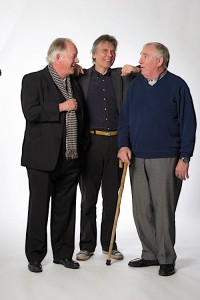 Bob continued to do sessions for other people. He’d been at school with some harmony-singers who engaged his services to play on a session for what became frankly, according to him, a completely unexpected hit record for all of those involved. “Concrete and Clay” by Unit 4+2 was a huge success around the world selling millions of copies for which he says: “I received the princely sum of £5 and change, a gold disc denoting a million sales and a Fry’s ‘Shooting Star’ award!” Eventually, this led to him spending an extended time in many European cities, resorts and casinos with the rest of The Roulettes backing a well-known French singer named Richard Anthony.
Bob continued to do sessions for other people. He’d been at school with some harmony-singers who engaged his services to play on a session for what became frankly, according to him, a completely unexpected hit record for all of those involved. “Concrete and Clay” by Unit 4+2 was a huge success around the world selling millions of copies for which he says: “I received the princely sum of £5 and change, a gold disc denoting a million sales and a Fry’s ‘Shooting Star’ award!” Eventually, this led to him spending an extended time in many European cities, resorts and casinos with the rest of The Roulettes backing a well-known French singer named Richard Anthony.
“It was during the mid-sixties that I thought it was time the UK had a drum record like Sandy Nelson’s, so Bobbie Elliott and I went into the studio to make one called “Drum and Coke”. No adverse pun was implied in the title; it absolutely wasn’t a drug reference, although the B-side of the record was intentionally riddled with puns – it was a music-hall type song called “Why Won’t They Let Us Drummers Sing”. Henrit and Elliott hoped it was a self-explanatory title to anybody who heard it.
On returning to the UK after almost a year based in France with Richard Anthony, he trod water back playing with ‘Unit 4+2’ while holding his breath excitedly waiting for the next band, Argent, to get going.
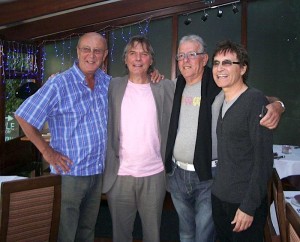 With ‘Progressive Rock’ on its way, ‘Argent’ was Rod Argent and the other guys in the band’s way of escaping from the undeniably pop music side of the Zombies and Unit 4 + 2, and push the envelope in a more interesting direction. Argent (the band) set to this task with a will and it worked. They sold several million records with hits like “Hold Your Head Up”, “Liar” and “God Gave Rock And Roll To You”.
With ‘Progressive Rock’ on its way, ‘Argent’ was Rod Argent and the other guys in the band’s way of escaping from the undeniably pop music side of the Zombies and Unit 4 + 2, and push the envelope in a more interesting direction. Argent (the band) set to this task with a will and it worked. They sold several million records with hits like “Hold Your Head Up”, “Liar” and “God Gave Rock And Roll To You”.
As Bob tells it: “Life was good for us, but the net result of all this success meant we were constantly forced to make hay while the sun shone. We undertook more and more gruelling tours around the civilised world. This continued for five or six years – without any time off for good behaviour. If we weren’t on the road, we were spending time locked in the studio working on new albums.”
Inevitably this pressure caused the band to split up, although a ‘Power Trio’ called ‘Phoenix’ emerged from its ashes and carried on where Argent left off – albeit in a slightly more obvious musical direction. Eventually this morphed into another band called ‘Charlie’. Meanwhile for fun, Bob was playing on the side with ‘GB Blues Company’, a ten-piece blues band which, although it never made any money, was “the most fun a drummer could have sitting down!” This was when he received a call to do a European tour and record with Ian Mathews, followed by another from Don McLean, both looking for a drummer – although fortunately not at the same time.
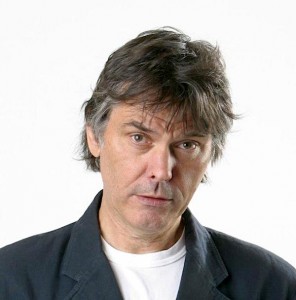 Because Bob could play loud and fast as many times as necessary, this period meant that he also made records with punk bands. These band’s names are still unknown to Bob and he was required to play for them as their drummers had no interest in playing a track more than once in the studio. Recording engineers and producers from Marquee studios, which was slightly further along Wardour Street from the newly opened Henrit’s Drumstore, would run in panic-stricken looking for drummers because theirs had given up playing after one take and gone down the pub! This clandestine activity took place alongside the more mainstream album recording stints with the likes of Colin Blunstone on “I Don’t Believe In Miracles”, Leo Sayer’s “One Man Band”, Roger Daltrey’s “Giving It All Away” and even Ringo Starr’s, “On The Rebound”!
Because Bob could play loud and fast as many times as necessary, this period meant that he also made records with punk bands. These band’s names are still unknown to Bob and he was required to play for them as their drummers had no interest in playing a track more than once in the studio. Recording engineers and producers from Marquee studios, which was slightly further along Wardour Street from the newly opened Henrit’s Drumstore, would run in panic-stricken looking for drummers because theirs had given up playing after one take and gone down the pub! This clandestine activity took place alongside the more mainstream album recording stints with the likes of Colin Blunstone on “I Don’t Believe In Miracles”, Leo Sayer’s “One Man Band”, Roger Daltrey’s “Giving It All Away” and even Ringo Starr’s, “On The Rebound”!
The workload took it’s toll and Bob was ill in 1975. Phil Collins had been drafted in to play on the half of an Argent album Bob couldn’t manage. It was called ‘Counterpoints’ and the proviso was that, according to Phil: “if Henrit died he’d get the gig”. Fortunately neither of these things came to pass, so when Peter Gabriel decided to leave Genesis, Phil invited Bob to join him in their new band but in the event, contractual obligations made this impossible. Instead Bob toured and recorded with Ian Mathews, Mike Rutherford and Richie Havens before Don McLean booked his drumming services for a couple of busy years. The first tour with Don was at the time of “Cryin” and it demanded a large orchestra. This was a baptism of fire as far as Bob was concerned because it inevitably necessitated having to read music.
After this he set-off looking for America on a ‘Silver Eagle’ bus with Don McLean and Garth Hudson to play in places most American musicians have never been (Dewey Oklahoma anyone?).
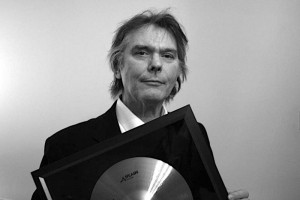 Having played on Dave Davies’ two solo albums he came to the notice of his brother Ray at a GB Blues Co. gig who then and there asked him to join the Kinks. Many albums and world tours later The Kinks were inducted into the Rock and Roll Hall of Fame. In 1995 Bob flew on Concorde to play at the Hall’s foundational concert in Cleveland at the Browns’ Stadium, along with Chuck Berry, James Brown, Bruce Springsteen and most of the great and good of Rock ’n’ Roll. In 1992 Bob received the ‘Ivor Novello Award’ for services to music.
Having played on Dave Davies’ two solo albums he came to the notice of his brother Ray at a GB Blues Co. gig who then and there asked him to join the Kinks. Many albums and world tours later The Kinks were inducted into the Rock and Roll Hall of Fame. In 1995 Bob flew on Concorde to play at the Hall’s foundational concert in Cleveland at the Browns’ Stadium, along with Chuck Berry, James Brown, Bruce Springsteen and most of the great and good of Rock ’n’ Roll. In 1992 Bob received the ‘Ivor Novello Award’ for services to music.
We’ll let Bob take over the story – “The Kinks’ activities invariably went in fits and starts and during a period of inactivity, while still writing for magazines like Rhythm and Modern Drummer, I was engaged to write the biography of a highly influential Music Business chap called Ivor Arbiter. He was responsible for several revolutionary innovations in the musical instrument industry and more specifically the drum world. He had a new and exciting project up his sleeve which used a single screw to tune the head, something I was very taken by, so when I was asked to assist with the development, promotion and marketing of it I jumped at the chance.”
With Bob’s help this way-ahead-of-its-time, ‘Advanced Tuning’ system had limited success amongst conservative drummers but gave rise to ‘Flats’ – designed to be the first highly-portable acoustic drum set in a bag.
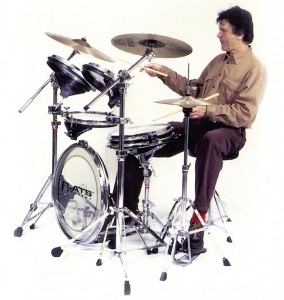 Bob says: “It was obvious that Flats could and should go further and in 2005 I resolved to take the idea to its logical conclusion – which necessitated moving away from Arbiter. ‘Traps’ were the much-improved outcome of this step forward and are still in demand around the world – in acoustic and electronic versions.
Bob says: “It was obvious that Flats could and should go further and in 2005 I resolved to take the idea to its logical conclusion – which necessitated moving away from Arbiter. ‘Traps’ were the much-improved outcome of this step forward and are still in demand around the world – in acoustic and electronic versions.
“I was reasonably knowledgeable on the subject of electronic drums having written a couple of books about them and consequently was deemed to be just the person to ‘sample’ the drum sounds into the ‘brain’ of Simmons’ all singing, all dancing’ SDX’ drum set. ‘Impulse One’ from Alan & Heath was a taste of things to come, being a sampling drum machine, and the next product I was called upon to do development and more ‘drum sound sampling’ work for. The Traps drum brain which came quite sometime later was deliberately engineered to be fool-proof so that you didn’t need a degree in electronics to operate it.”
But obviously there’s another side to Bob, and one that has bought his to the attention of drummers all around the world. Having begun his writing career doing his English homework on the trolleybus on the way to that Catholic College, he continued it, firstly by writing for ‘Beat Instrumental’ and then ‘Melody Maker’ in the sixties. Later still, Bob was regularly writing for ‘International Musician’ whilst running his drum store in the seventies. He still writes regularly about drums, sadly no longer for Melody Maker, but contributes on demand to Rhythm, Modern Drummer, Rimshot, Drum! and various other magazines around the world. He is constantly working on multi-media projects.
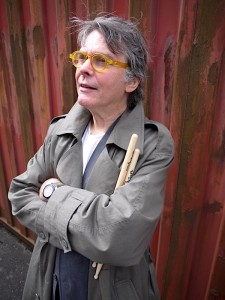 After writing appraisals of all the electronic drums on the market for various publications, he was ideally placed to write a couple of books on electronic drums. These were both published in the eighties, and were ‘The Complete Electronic Drum Book’ and ‘The Complete Book of The Simmons Drum’.
After writing appraisals of all the electronic drums on the market for various publications, he was ideally placed to write a couple of books on electronic drums. These were both published in the eighties, and were ‘The Complete Electronic Drum Book’ and ‘The Complete Book of The Simmons Drum’.
His autobiography, ‘Banging On!’ was published in 2014 and ‘The Hayman Drum Book’ came out a couple of years later. At the moment he’s putting the finishing touches to two more books. The first may well be succinctly entitled ‘Crash, Bang, Wallop’ and is about drums in the UK, and the second is a musical travelogue called ‘On The Road Again!’. This contains stories of his experiences of his sixty years of travelling – musically and otherwise. He has also started work on the alleged novel we each have in us – several times. His is about a drummer and something which he hopes will someday be finished – but only ’in the fullness of time’! (now there’s a novel title for book on drums…)
Each month he contributes one or two pieces to www.mikedolbear.com and when he can, he writes travel pieces for a number of publications.
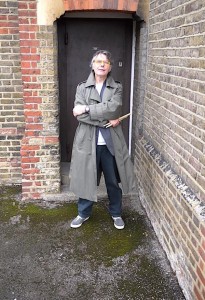 The neighbour who lived on the other side of the Henrit family to Cliff Richard in Waltham Cross worked in films and out of the blue in 1984 she called him to see if Bob could help her find musical artefacts from the fifties. She needed to dress the many sets for a film she was working on with David Bowie and Ray Davies called ‘Absolute Beginners’. “All of a sudden I was something of an Art Director without any idea what the title meant. That film successfully lead to another, this one being produced by HBO and a love story, called succinctly ‘Imagine, John and Yoko.’”
The neighbour who lived on the other side of the Henrit family to Cliff Richard in Waltham Cross worked in films and out of the blue in 1984 she called him to see if Bob could help her find musical artefacts from the fifties. She needed to dress the many sets for a film she was working on with David Bowie and Ray Davies called ‘Absolute Beginners’. “All of a sudden I was something of an Art Director without any idea what the title meant. That film successfully lead to another, this one being produced by HBO and a love story, called succinctly ‘Imagine, John and Yoko.’”
As far as actual drums are concerned Bob Henrit started out with a ‘Bitsa’ set followed by a Carlton, followed by the black Trixon with which he joined Adam Faith. This was followed by another almost identical Trixon he specially ordered with International dimensions when he became an endorser in 1963. In time he bought himself a Ludwig, a Gretsch, and a Slingerland whereupon his obsession with acquiring collectable drum sets began – he was once the nervous possessor of 35 drum sets and 55 snare drums all stored on his loft.
When Hayman drums were launched, Bob became an endorser although eventually he moved to Pearl in the seventies, then on to Mapex at the turn of the century. He’s been a Zildjian endorser since 1962 which may be something of a record. Bob’s also been an inventor in his day, creating the Novo cymbal for Paiste, Roto-tom foot pedal for Remo and the drum key cymbal topper for Zildjian.
As far as gigs are concerned, these days Bob happily responds to the telephone to play as often as possible with various pals, including the guys from Argent: Russ Ballard, John Verity and Jim Rodford, as well as Mark Griffiths and Bob Skeat
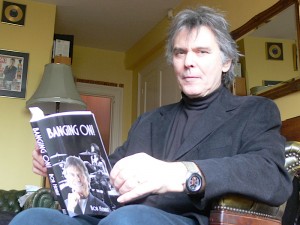 To promote his books he unashamedly carries out various speaking engagements for men’s clubs, women’s clubs and golf clubs under the tongue-in-cheek title of ‘Sex and Drugs and Rock and Roll’. He also talks at drummers’ get togethers like Rob Cooke’s Chicago Show.
To promote his books he unashamedly carries out various speaking engagements for men’s clubs, women’s clubs and golf clubs under the tongue-in-cheek title of ‘Sex and Drugs and Rock and Roll’. He also talks at drummers’ get togethers like Rob Cooke’s Chicago Show.
Was he surprised to still be playing aggressive drums at an advanced age?
“To tell you the truth I hadn’t given it too much thought. I have friends who are considerably older than me who are still rushing round the world doing gigs. We’ve spoken of this and of course it’s not the playing that does the damage; we’re accustomed to that and we’ve been doing it all our lives. What does hurt is the hanging about, the travelling, the living out of a suitcase and the sameness of it all. Jet lag affects you more as you get older – as does flying in general. Your health is your wealth in advancing years therefore it’s much more difficult to stay up all night baying at the moon. Especially if you were a musician during the ‘swinging’ sixties and you’ve made more than seventy journeys around the sun!”
At the moment he’s working on a project which is so top-secret, if he told you about it he’d have to kill you! Watch out for it around this time next year.
“On the vexed subject of longevity, Adam Faith died in 2003 and we four Roulettes carried his coffin. In his tribute Michael Parkinson started by drawing the attention of the mourners to the fact that it was unusual to see a group from the sixties who were all still alive! But then, it’s a good idea to have goals in life!”
October 2017

